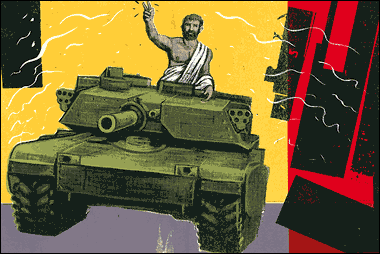Way Back to the Future
By PARAG KHANNA
Robert Kaplan has been enchanting armchair policy wonks and distressing foreign policy-makers since his long essay, "The Coming Anarchy," was featured on the cover of the Atlantic Monthly in 1994. Five years later, he published an eponymous collection of essays ranging from meditations on democracy to a bold defense of Kissinger's Realpolitik in comparison to the 1990’s foreign policy of Christopher, Albright and Berger, earning Kaplan the label of heir to Kissinger's school of "tragic realism". With the publication of Kaplan’s latest book, Warrior Politics, it is clear that he deserves it. Expanding upon another Atlantic article, “The Return of Ancient Times,” Warrior Politics is a tour de force defense of classical realism adapted to modern chaos. In a world of great turbulence and complexity, Kaplan argues, the philosophical wisdom of the classics teaches that primitive necessity and self-interest drive politics towards stability, whereas rigid moral arguments lead to war. As no amount of liberal moralizing can eliminate conflict from the human condition, conflict can only be mitigated through prudent judgment grounded in historical fact. Kaplan draws on a rich humanist tradition to shatter the illusion of a collective post-Cold War horizon of progress for humanity. No need to search for a catch-all phrase for the 21st century beginning with "post-"; the Old is the New. Each chapter of Warrior Politics contains brief yet entertaining intellectual biographies and epoch-bridging analogies. Rather than rely on Winston Churchill’s better-known wartime reflections, for example, Kaplan affirms the richness of Churchill’s “historical imagination” through a reading of his precocious 1899 two-volume account of fighting in Britain’s reconquest of colonial Sudan. He moves on to Livy’s The War With Hannibal, a history of the Second Punic War which brought Rome to the apex of its dominance. Subsequent chapters contain reflections on Sun Tzu’s The Art of War, Thucydides’ History of the Peloponnesian War, Machiavelli’s Prince, Hobbes’s Leviathan, and Malthus’s Essay on the Principle of Population. Both historians and readers unfamiliar with Kaplan’s style may be troubled by the ease with which he compares Hannibal to Hitler, Achilles and Radovan Karadic, Syracuse to Vietnam and the Punic Wars of the third century B.C. to the World Wars of the 20th century. This technique is necessary, however, to demonstrate both the constants of human nature through history and hence that “Machiavelli’s self-evident truths are independently discovered in every age.” Though historically scattered, the grand scope of Kaplan’s work does, however, allow for a synthesis of philosophy and foreign policy, which have been driven apart by the tension between Judeo-Christian morality and “pagan virtue”. The latter is best encapsulated in Machiavelli's dictum that in a highly imperfect world, good men bent on doing good must learn how to be bad. The effectiveness of a policy to stabilize the political community is its virtue. Kaplan denounces the binary good versus evil public discourse in America as ignorantly representing the idea that “morality is completely a Judeo-Christian invention.” Kaplan's wide-ranging analysis results in the prescription of “constructive realism” for America's foreign policy woes. In a world where a plurality of political systems and corresponding virtues will exist, and “moral questions are often linked to questions of power”, constructive realism will place pagan virtue in the service of a self-interested foreign policy. Teddy Roosevelt was Kaplan's ideal "constructive realist", winning a Nobel Peace Prize for his 1905 mediation efforts between Russia and Japan, yet at the same time balancing their threats to American interests and security. Kaplan also treads a fine line between determinism (the all-powerful constraints of nature) and individual responsibility (the awesome cunning of great leaders), settling on Raymond Aron’s realism: “Human choice operates within certain contours”. Today’s leaders could actually enjoy greater power if they recognized the cultural limitations they face in maneuvering nations. This is not fatalism, but rather what Aron called “anxious foresight”. Kaplan's scholarship makes foreign policy-makers squeamish because his intellectual voyages vividly portray a world entering neo-medievalism, where shrinking state authority and spreading technology breeds competition with powerful transnational social groups such as Osama bin Laden's al-Qaeda network, for example. He has written that the map of the world is constantly in flux, and the "post-colonial era is only in the early phases of collapse." How is Washington or Moscow or Ankara to govern in such a scenario? Kaplan has called for reinstating assassinations as a tool of foreign policy, strengthening intelligence agencies, and letting spies off the bureaucratic leash—all notably underway—but he ends Warrior Politics with a plea for the return of philosopher kings and erudite leaders who identify more with the Roman adage "If you will peace, prepare for war," than with 60's generation ideals. Few writers have delivered such a stark and humanist warning about the world since the end of the Cold War. Yet beyond the controversial policy prescriptions, Kaplan is supported by political science research which demonstrates that foreign policy usually only shifts after systemic “shocks”. The devastating attacks of September 11 would indeed qualify as such a shock, suddenly making global security local for everyone. Populist movements have been empowered in a post-industrial world; destructive potential is miniaturized and spread through technology and communications. If this is indeed the long-term post-Cold War scenario experts have longed to have taxonomized the way George Kennan laid out the Cold War in the late 1940s, then Robert Kaplan’s voice of caution and reflection must be heeded.
